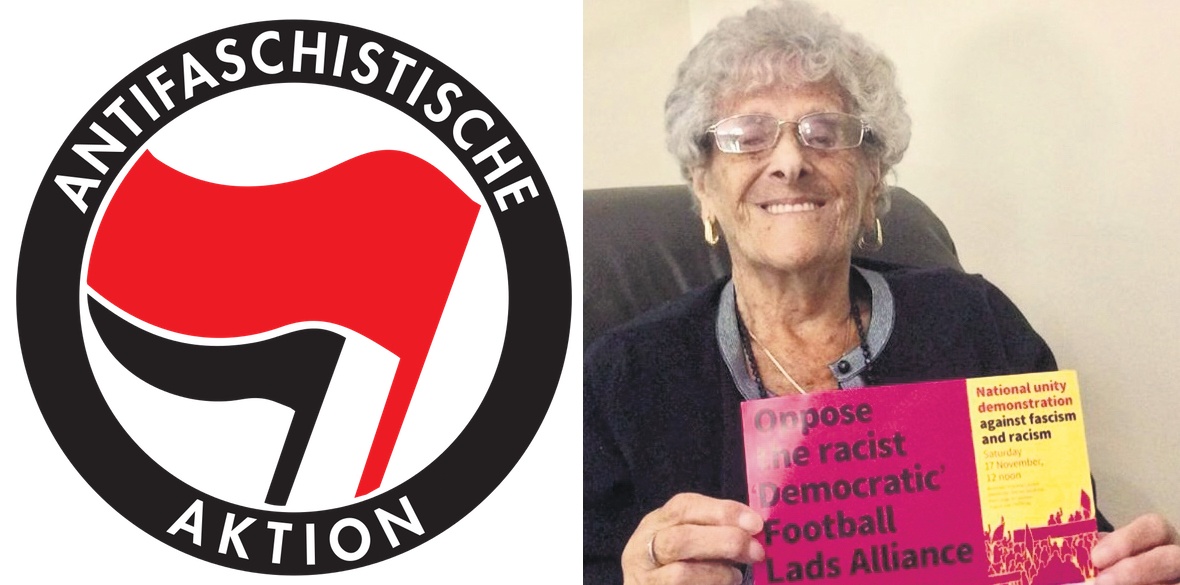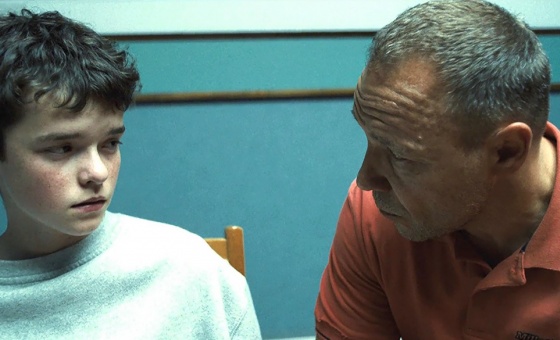This is the last article you can read this month
You can read more article this month
You can read more articles this month
Sorry your limit is up for this month
Reset on:
Please help support the Morning Star by subscribing here
Before visiting Beatty Orwell in East London, I asked writer Kate Thompson’s advice on what to bring. Thompson had interviewed Orwell and her peers for her book The Stepney Doorstep Society, and got to know her well.
She suggested I stopped at Rinkhoff’s on Vallance Road, just round the corner from Orwell’s flat.
This turned out to be a good steer. Talking to the celebrated Jewish bakery’s owner, I mentioned I was visiting a woman who had been around slightly longer than his shop — 101 years to Rinkhoff’s mere 100. He knew exactly who I meant, pointing me in the direction of Orwell’s favourite pastries.
A few minutes later, pastry box in hand, I was shown in to Beatty Orwell’s sunny, immaculate flat by her daughter June.
Moving to a ground floor flat was one of Beatty’s few concessions to her years — until she was 98, she’d lived in a fourth floor flat with no lift.
Comfortably ensconced in an armchair in the front room, overlooking her own courtyard which, she told me with a smile, abuts Brady Street Jewish Cemetery (“They can just throw me over the wall!)” was a petite woman of obvious and immediate warmth, who, like her daughter, looked a good decade younger than she is.
It was soon clear that while her eyesight might be failing her, Orwell’s memory, intelligence and gift for the one-liner were not.
I began by asking her about her political activism, which started in her teens and has yet to end (in addition to her anti-fascist activism, Orwell is a Labour Party stalwart, and was a Tower Hamlets councillor in the 1970s. Her late husband John was Mayor of Tower Hamlets twice; a leisure centre named after him is nearby).
What, I wondered, got her started back in the 1930s? She was on record as saying neither her parents nor her two sisters were interested in politics.
“I don’t know, really – my mother used to say, ‘I don’t know where we got her from!’” So there was nothing in particular that set you on that road, I asked? “Well – I couldn’t dance, you see!” she shoots back with a smile.
When some people their age were in the dancehalls, Beatty and her great friend Ginnie were hanging out instead in a cafe in Osborn Street, which had become a meeting place for anti-fascists from the Labour and Communist Parties; here, the girls first heard the name of the man who would try to bring terror to their streets, Oswald Mosley.
From the early 1930s Mosley, born into an aristocratic family, was nursing ambitions to be a British fascist leader. After military service in World War One, he entered Parliament as a Conservative at only 22. The quintessential chancer, possessed of superficial charm, personal ruthlessness and a gift for oratory, Mosley’s progress in democratic politics could not satisfy his overweening ego. After falling out with the Tory Party over policy on Ireland, Mosley crossed the floor to sit as an Independent in opposition to the government.
He joined Labour in 1924, and was a committed Fabian for the rest of the decade. In 1931, after failure to drive though his proposals on unemployment as a Labour minister, Mosley broke away entirely to form a new party, imaginatively named the New Party.
Members would include the infamous William Joyce, later nazi propagandist “Lord Haw Haw,” ultimately executed for his crimes.
The New Party was not initially anti-semitic. Mosley had Jewish friends, and his bodyguard was the boxing champion Kid Lewis, born Solomon Mendeloff.
The New Party failed to get a single candidate elected in the 1931 election, and this defeat started Mosley on a new and extreme course. After a visit to Mussolini in Italy in 1932, he disbanded the New Party to form the British Union of Fascists (BUF), popularly known as the Blackshirts. According to Mosley’s son Nicholas, as so often in dubious British politics, a press baron was instrumental too. Lord Rothermere, founder of the Daily Mail, had met with Mosley and informed him that all the papers Rothermere owned would be at his disposal, if he could turn the New Party into a disciplined fascist organisation.
There was one surprising early anti-fascist voice in this: Mosley’s wife Cynthia. She loathed fascism, and Rothermere; and threatened to take out a notice in The Times dissociating herself from her husband’s dangerous new political direction.
Mosley’s ruthless misogyny, so often a wellspring of fascism, was demonstrated in his behaviour as a husband. Cynthia’s father, Lord Curzon, had urged her not to marry him, suspecting him of being a gold-digger, and politically – and in every other way – untrustworthy. It is a truth universally acknowledged, however, that young women in the sway of handsome cads rarely listen to fathers; Cynthia married him, and Mosley took revenge on his reluctant father-in-law by carrying on affairs thereafter with both his wife’s sister and their stepmother, Curzon’s wife. When Cynthia died at 34 of peritonitis, Mosley married another of his mistresses, Diana Mitford.
The BUF was not Britain’s first foray into fascism: there was also the British Fascists founded in 1923, and in 1928 the Imperial Fascist League, which lasted through World War II. It was, however, by far the most successful.
Initially the British Fascists derided the BUF as “kosher fascists,” suggesting Mosley was “in the pay of the Jews.”
But the Union was unstoppable, quickly becoming a private army: not only uniformed, but living and training in a private barracks, known as The Black House, in Chelsea.
It soon became clear to Mosley that anti-semitism was a useful recruiting tactic, and the East End the place to begin: so much poverty, and well-established Jewish communities that could be scapegoated for it.
The Blackshirts aimed at intimidation, deliberately congregating close to Jewish communities, standing on literal soap boxes, spewing abuse about “the Yids” and trying to provoke division. Regrettably, they had some success at this old game of “blame the foreigner,” and built bases in the East End.
The organisation first revealed its true colours on a mass stage in 1934, at a huge, Nuremberg-style rally at London’s Olympia.
The crowd inside the arena was some 10,000-strong; Mosley kept them waiting for dramatic effect before making a monarchical entrance, accompanied by three flag bearers.
He proceeded to herald the “advance of the Blackshirt”; fascism, he claimed, was progressing faster in Britain than any other country.
He played on the alleged dissatisfaction of former servicemen with the government of the country they had so loyally served and – in a clear signal that he was prepared to seek power by other than democratic means – of the wider population with parliamentary politics as a whole. People sought, he claimed, “a new order.”
Despite the fact that tight BUF security had kept out most protesters, who were gathered around the venue, Mosley can be heard in recordings of his speech telling the crowd to ignore “little interruptions.” These came from the almost suicidally brave anti-fascists who had made it through; despite being hugely outnumbered, they were not going to be ignored.
To gasps from the crowd, one climbed precariously to the roof by means of steel girders, pursued by Blackshirts, to drop down anti-fascist leaflets.
All hell broke loose. Protesters were kicked, punched and beaten by groups of Blackshirts and finally ejected. At least one, Churchill’s nephew Esmond Romilly, was thrown down a flight of stairs; it was an intense relief, Romilly wrote, to find himself outside amongst the “ministering angels” of the anti-fascists.
What I had not known was that these included Beatty Orwell. When I asked Beatty Orwell whether she had heard much about Olympia, being only around 17 at the time, her reply was an unexpected: “Well, I was there, of course!”
She and Ginnie had seen Mosley arrive in a cavalcade of “fancy cars,” a reminder that, despite his “man of the people” act and willingness to harness working-class muscle, Mosley’s real life was lived at a safe remove, within a bubble of wealth and privilege.
Orwell later saw BUF fans running out of the arena, anxious not to be associated with the violence: one was Unity Mitford, sister of Mosley’s second-wife-to-be, Diana: “She really did run!” she tells me, with some amusement.
So, Orwell had been at these two legendary protests. But could she remember the beginnings of the BUF, and the street-corner intimidation? She tells me that, yes, she remembered many fascist street gatherings in Bethnal Green.
It must have been frightening for her, as a young Jewish girl, then of only about 15 or 16, to have to walk past them, I ask? I should have known better than to have for a moment thought Beatty Orwell would have simply walked past:
“Well – I shouted at them. ‘Fascist bastards’, I’m afraid!”
Not only is this very cool, it’s also an important reminder of how street anti-fascism worked in the 1930s – no matter how young they were, no matter how vulnerable or outnumbered, these brave women and girls, men and boys, were prepared to confront and protest against fascism whenever and however they found it.
Who knows how many people were silently heartened by Orwell’s succinct street-corner critiques? Despite some subsequent criticism of the Olympia counter-protesters, they succeeded in losing the BUF high profile support by drawing out the violence inherent within fascism.
There has been some carping about Cable Street, in recent years, as over-hyped: “It didn’t actually stop fascism,” I’ve been told on social media, as if one day in London could have stopped a global movement, or World War II might have slipped my mind.
But sheer force of numbers that October in the East End stopped Mosley both literally and figuratively. He himself called it a humiliation; furthermore, rather pleasingly it took the shine off his second wedding – as historian David Rosenberg pointed out to me recently, it was no coincidence that Mosley had scheduled his marriage to Diana Mitford, which took place at Goebbels’s house in Berlin with Hitler in attendance, two days later; he had no doubt planned to meet prominent nazis on a wave of triumph, boasting of taking London by storm. As it was, he must have been a little shamefaced – perhaps, Rosenberg speculates, “he had to talk about the football instead!”
This public defeat certainly drew the ire of Mussolini, who had been virtually underwriting the BUF financially but who now withdrew donations. The Union began to collapse from this point on.
We now face the rise of new far-right groupings like Generation Identity and the Football Lads’ Alliance, we have an avowed fan of white supremacy in (appropriately) the White House, and US money subsidising the far right here including, it is suspected, Tommy Robinson. Last month brought us the shocking spectacle of the City of London literally giving Robinson a platform: he was permitted to build a stage, complete with powerful state-of-the-art sound system, right outside the Old Bailey.
In Germany, we have seen supporters of Alternative for Germany (AfD) chasing foreigners and leftwingers though the streets of Chemnitz.
AfD leader Alice Weidel was invited to speak by the Oxford Union on November 7 – only after significant work by anti-fascists like Shaista Aziz and Dana Mills did Thames Valley Police raise safety concerns which led to this being cancelled. Oxford Union, predictably, attempted to wave the “freedom of speech” magic wand at criticisms of this, but how much free expression we could hope for under an AfD regime has been illustrated by AfD’s desire to set up online portals for schoolchildren to report teachers who voice criticism of the party.
What, I ask Beatty, would she say to those who, despite all of this, still argue we shouldn’t get involved in spontaneously confronting the far right?
“You have got to try to stop them marching; you have to protest, whenever they appear,” she tells me. ‘You can try not to get involved with fascists all you like – but if you don’t, they will get involved with you!”
Join the National Unity Demonstration on Saturday November 17, assembling in central London from noon.









